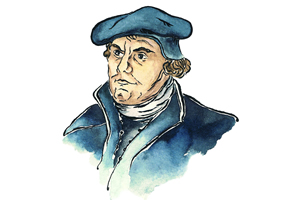A Masterpiece of Letter Writing
The letter to Philemon is considered to be a “masterpiece of letter writing” and is the most personal of all of Paul’s letters. An overview.
Because of the warmth and love expressed in the letter to Philemon, the letter has been compared to the Old Testament book of Ruth. It’s lines from a cell; that is, a letter written by the Apostle Paul while imprisoned in Rome, to his rich friend Philemon, who apparently lived in Colossae (Colossians 4:7-10). There he was, working alongside Archippus, a fellow church elder, and making his house available for the church to meet (Philemon 2). Paul wrote this letter around AD 62. The Scofield Bible names its theme as “love exemplified.” William MacDonald comments, “This little missive shows the courtesy, tact—with a dash of humor—and the loving heart of Paul.”
This letter concerns the Apostle’s struggle for a slave named Onesimus. Onesimus had been employed in Philemon’s house, and had probably robbed his master (v. 18). Due to his flight to Rome, he had somehow ended up in prison there. He met Paul among the prisoners, and was converted. Now Paul was sending him back, along with a coworker named Tychicus, who took a letter from the Apostle to the Colossians and one to Philemon (Col 4:7-10). In the letter to Philemon, we see the love of the Savior exhibited through Paul toward a man who was caught in sin, even in the midst of his own captivity. Paul had a heart for kings, governors, princes, soldiers, and slaves alike. Paul reached both the rich Philemon and the poor slave Onesimus with the Gospel. It’s noteworthy how Paul assumes the position of a lawyer dedicated to his client, and represents him. The great Apostle fights, wrestles, and vouches for Onesimus, who was “only” a slave.
We also see that the Holy Spirit’s work cannot be bound. Despite captivity, Paul was free. The Lord can also use the most unfavorable circumstances in our lives and make something of them, to proclaim His glorious name. So, the Lord doesn’t just use large, well-organized gatherings to save people around us, but also our everyday lives and the situation we’re in. Paul could just as easily preach the Gospel to kings, synagogues, Areopagus in Athens, or in prison. He could be used anywhere, and didn’t make his condition an obstacle to testifying of his Lord.
The letter to Philemon also shows us how the Gospel can change people. For one thing, in the relationship of a sinner to God; but apart from that, within interpersonal relationships as well. We see how important it is to remedy the wrongs we’ve committed, despite being forgiven. Onesimus is sent back to his master. Forgiveness is emphasized here, but the wrongs committed must also be corrected and sorted out in front of others.
From the Apostle’s letter, we further learn how wisdom prevails. Paul acts wisely; deliberately not as an apostle, but as a friend and brother, and even with a certain deference to Philemon. As a result, he wins this beloved brother again to his cause. “The mouth of the righteous speaketh wisdom, and his tongue talketh of judgment” (Psalm 37:30). And, “he that winneth souls is wise” (Proverbs 11:30b).
In the letter to Philemon, the Holy Spirit turns out to be the One who possesses and conveys tact. The Scofield Bible remarks, “[The letter] is of priceless value as instruction in practical righteousness; Christian brotherhood; Christian courtesy; and the law of love.”
 Martin Luther wrote: “This epistle gives us a masterful and tender illustration of Christian love. For here we see how St. Paul takes the part of poor Onesimus and, to the best of his ability, advocates his cause with his master. He acts exactly as if he were himself Onesimus, who had done wrong. Yet he does this not with force or compulsion, as lay within his rights; but he empties himself of his rights in order to compel Philemon also to waive his rights. What Christ has done for us with God the Father, that St. Paul does also for Onesimus with Philemon. For we are all His Onesimuses if we believe.”
Martin Luther wrote: “This epistle gives us a masterful and tender illustration of Christian love. For here we see how St. Paul takes the part of poor Onesimus and, to the best of his ability, advocates his cause with his master. He acts exactly as if he were himself Onesimus, who had done wrong. Yet he does this not with force or compulsion, as lay within his rights; but he empties himself of his rights in order to compel Philemon also to waive his rights. What Christ has done for us with God the Father, that St. Paul does also for Onesimus with Philemon. For we are all His Onesimuses if we believe.”
Last but not least, we learn that if each of us saw ourselves as an Onesimus, yet stood up for brothers and sisters as a Paul, things would be well in the kingdom of God and we would have no brotherly difficulties.
Midnight Call - 03/2021


